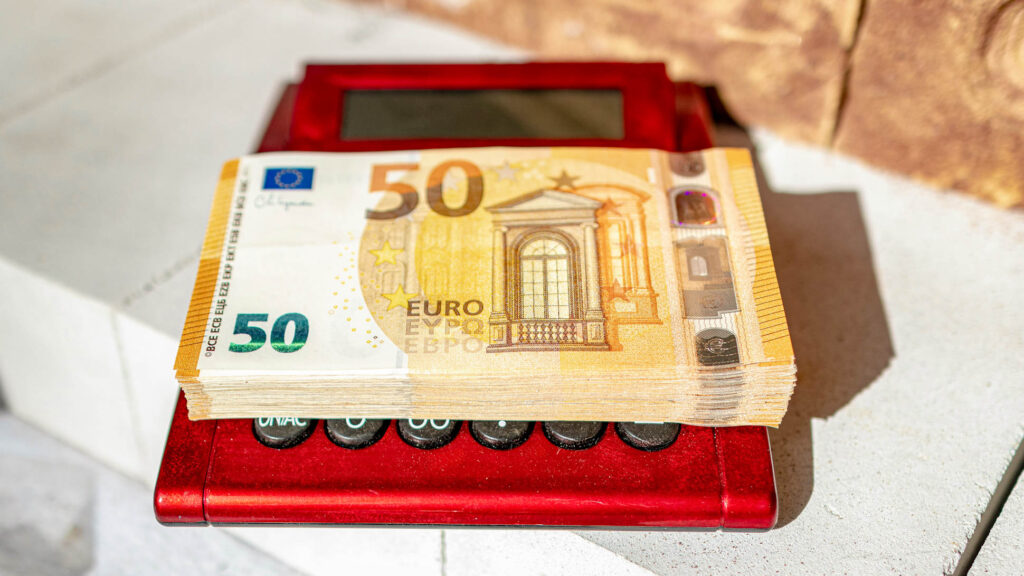
When you’re buying property in Italy, understanding how money moves is almost as important as finding the right home. Payments, contracts, and even day-to-day expenses follow rules that can feel different compared to other countries.
This guide explains what you need to know, from formal banking to informal habits, so you can navigate safely.
🔗 Part of our series: Foreign Buyer Practicalities: Residency, Visas, Inheritance
Italy’s Two Economies: The Official and the “In Nero”
Italy is well known for having both a formal economy and a shadow one. The latter is often described with the phrase “in nero”, literally meaning “black”, and referring to payments made in cash, without receipts, and outside of official records.
Some small businesses or tradesmen may still suggest in nero payments, often promising a discount. While this might look like an advantage on paper, it comes with serious risks: no receipts, no legal protections, and potential trouble if authorities check. For property buyers, especially foreigners, steering clear of in nero is essential—always demand documented, traceable transactions when it comes to contracts, deposits, or restoration work.
Property Transactions: Traceable Payments Only
In property deals, transparency is non-negotiable. The notaio (notary) overseeing the transaction will only accept payments that are documented and verifiable. Transfers must usually go through Italian bank accounts, and large sums in cash are not permitted.
For this reason, opening an Italian bank account is one of the first steps once you decide to buy. It makes paying professionals, taxes, and ongoing bills easier and avoids complications at the closing table. Learn more here: Role of a Notaio in Italy.
Electronic Payments in Everyday Life
For years, Italy lagged behind other European countries in the adoption of card and mobile payments. Until 2022/2023, it wasn’t uncommon for cafés, bars, or small shops to refuse cards entirely. Things have improved: new regulations require merchants to accept electronic payments, and penalties apply if they refuse.
Still, in practice, some smaller shops—especially in rural areas—may prefer cash. Always carry some euros with you, but expect to use your card for most transactions in cities and tourist areas.
Currency and Bank Transfers
Italy uses the euro (€). When transferring large sums, such as for deposits or renovation payments, foreign buyers often rely on international transfer services or their Italian bank account.
A few tips:
- Use SEPA transfers (Single Euro Payments Area) for euro transactions in the EU. They are low-cost and usually fast.
- Compare exchange rates carefully when moving money from a non-euro currency. Even small differences add up in large property transactions.
- Avoid cash for big payments. Not only is it impractical, but limits on cash transactions are strict (usually €5,000 and below).
For ongoing costs, many utilities and taxes are paid via RID/SEPA direct debits. Setting these up through your Italian bank account keeps everything streamlined.
Risks and Good Habits for Buyers
- Never pay contractors fully in cash. Insist on invoices and keep copies for your records.
- Check your notaio’s instructions carefully—payments for the final signing must always match what’s on the contract.
- Plan ahead for currency exchange. Some buyers lock in rates with forward contracts to avoid sudden fluctuations.
Conclusion
Italy’s payment culture is changing quickly, but old habits like cash-only transactions and in nero practices still exist. As a foreign buyer, stay on the safe side: keep everything transparent, use banks for major payments, and carry a mix of cash and cards for daily life.
📌 Related reading: Understanding Italian Property Taxes: What Buyers Need to Know
See Also:
Frequently asked questions — Payments & money for buyers
Can I pay large sums in cash for a property or renovation?
No. Large cash payments are strongly discouraged and often illegal for major transactions. For property purchases and official payments, use traceable bank transfers (SEPA or wire) and always keep written documentation and invoices.
Do I need an Italian bank account to buy property?
While not always strictly required, opening an Italian bank account makes the process far smoother. Notaries and contractors usually expect euro transfers from an Italian account, and recurring payments (utilities, taxes) use SEPA direct debit systems.
What does “in nero” mean and should I ever use it?
“In nero” means an undeclared, cash-based payment made without a receipt. Avoid it. It offers no legal protection, can create tax liabilities, and will cause problems if you need evidence of payment for contracts, guarantees, or tax deductions.
How should I transfer a deposit or purchase funds from abroad?
Use a reputable bank or transfer service and prefer SEPA (for euro transfers within the EU) or a documented international wire. Compare exchange rates and fees — even small differences matter for large sums. Keep all transfer confirmations for the notary.
Are electronic payments widely accepted in Italy?
Yes increasingly so—major towns and tourist areas accept cards and contactless. However, small shops in rural areas may still prefer cash. Always carry some euro cash when visiting smaller towns, but use bank/card payments for contracts and large expenses.
What documents or proof should I keep for payments?
Keep invoices (fattura), bank transfer receipts, and any written contracts. For renovations, require itemised invoices from contractors and keep them for tax benefits and proof of expenditure. These documents are essential at signing (rogito) and for tax/notary checks.
